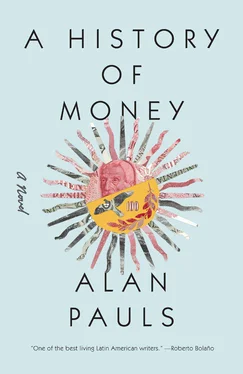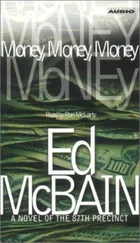No, it’s not ambition; it’s an absolute lack of hope, a sudden, frozen emptiness that opens in her chest when it becomes clear that she doesn’t have a peso left. This is what condemns his mother to wait for the demented miracle of money raining down from the sky. Less out of conviction than because they’re within her grasp and as fresh as ulcers, she starts with reasonable miracles, clinging desperately to the idea that sooner or later the Beast will be sold, no matter what state it’s in, no matter what time and the winters and the humidity and weeds and gangs of squatters with backpacks have done to it, and that she’ll recover at least some of what she lost. She hasn’t been back for a long time; she hasn’t witnessed half the metamorphoses it’s gone through; she can’t even picture it any longer. Every image she has of it is out of date. She remembers it only in dreams, on the rare occasions that she manages to sleep uninterruptedly, and the payback for those interludes stolen from insomnia — a miracle that’s almost more unheard-of than money raining down: she has her own table set aside in the hotel bar, and the night guard knows to switch on a light and serve her some tea or a glass of cognac when she comes downstairs with eyes like saucers at three or four in the morning — is a vision played at high speed of a type of creeping citadel growing constantly and in every direction, including down into the earth, following a system of interlocking cubes through which all manner of frightened little creatures pass in and out: moles, armadillos, guinea pigs from some useless experiment, which a psychotic stylist has decided to dress up in tiny rugby shirts. “It must be worth something,” she thinks. And if there’s no value in the house, in the grounds, the cement, the floor tiles, the window frames, the flagstones, or the mosaic tiling, then there must at least be some — just like in tales of adventure in which, for all his charisma and virtue, the hero always owes much of his appeal to his nemesis’s monstrosity — in the tragic role the Beast has played in her life; in the way in which the house lays waste to everything in the space of ten years.
Sitting in the hotel’s picture window in her nightgown, with her beautiful Italian raincoat hanging from her shoulders, getting a little tipsy from the cognac fumes, she daydreams about someone who hunts for grisly scenes in real estate, one of the vultures that patrol the stars’ neighborhoods in Hollywood with checkbook and pen at the ready, searching for ruined or abandoned mansions with blood spattered on the marble in the bathroom, the gold ceilings embroidered with bullet holes, poolhouses decorated with brain matter. Why not. Why shouldn’t she be blessed by one of these evaluators of misfortune. It must be worth something. But if anyone were to ask her what “something” means, how she measures “something,” she wouldn’t know what to say. Nobody would know what to say — just as committees of experts brought together to value the masterworks of idiotic artists, or idiotic works by masterful artists, don’t know what to say and can never reach an agreement. When she comes back down to earth and reassesses, and decides that only modesty will save her, she imagines small amounts, just a bonus, the difference that would understatedly but decisively remove her from this nightmare from which she can’t seem to wake up. But she waits, and she waits, and that modest little amount that would make her happy never comes, and once again the Beast becomes everything to her, responsible for taking everything she had and capable of giving it all back, and at those moments she opens her hotel room’s window in the middle of the night, in her nightgown, with her Italian raincoat falling off her shoulders and onto the floor, still completely unwrinkled, no creases at all except the ones the designers intended to be there, and she yells at the world, at the sleeping world of Calle Uriburu, the astronomical figure for which she’s prepared to talk — only to talk, she won’t guarantee anything beyond that — about selling the house. It’s clear, in any case, that the one possibility his mother never considers, neither in her moments of modesty, when she just wants to forget, nor when she’s overcome by the desire for revenge and she screams for the whole world to be signed over to her, is the ridiculous, paltry, disproportionately sad figure they end up getting from a Uruguayan construction firm, the last on a long list of buyers — and the only one that agrees to actually see the house — who disappear one after another when they see the photos: ten thousand dollars, to be halved with her ex-husband.
She’s almost in tears when she shows him her five thousand — a stack of fifty-dollar bills in a dirty, bulging envelope with a lottery ticket stuck to it like a stowaway, peeping out surreptitiously until she hides it in irritable embarrassment by shoving it to the bottom of her purse — under the fluorescent lights of the bar she arranges to meet him in after collecting it, a strange place — all tinted windows, with waitresses serving in their underwear and all wearing the same dark wig, like replicas of an original from Le Crazy Horse — two blocks from the basement office of the construction firm’s Buenos Aires sister company, or maybe it’s just the den of its team of accountants and lawyers. She raises the hand holding the envelope to call the nearest stripper — yes, it’s a dive, but the cheesecake is unbeatable — and he catches a neighboring regular following the gesture with a look of murderous longing. “Let them rob me,” she says disingenuously, and then, still crying, she blithely waves the bills in the air in a bid to divert the stripper’s attention away from a client who’s asking for clarification about the menu while staring at her chest. “What’s five thousand dollars compared with everything I’ve lost?”
This wasn’t exactly what she had in mind when she imagined money raining down. As a result, she doesn’t use it to alleviate or anticipate necessities, but rather as a sort of restorative compensation, damages for the misunderstanding of which she’s once again been the victim. She packs her little suitcase, settles her bill at the hotel, and waits until nighttime to say goodbye to the guard. And then she moves and spends all of it, down to the last fifty-dollar bill, at a slightly better hotel (three and a half stars, although the half star on the neon sign doesn’t always light up) on Calle Juncal, two blocks from the last one, with an elevator, cable TV, and a basket of umbrellas in the lobby for rainy days. She had envisaged something more unexpected and drastic, the type of downpour that’s unleashed without warning and changes everything, for good or ill, like a doctor holding an X-ray to the light, clearing his throat, and pointing at a laughable little white cloud growing hesitantly in the middle of the pancreas. She was thinking of a true event, the type that always intrudes in such an untimely fashion in old romance novels, with a visit — announced by a bell that shreds the tranquility of a home that’s had little to do with the outside world — or a letter in a tattered, worn-out envelope, its address so poorly written that it’s been lost and sent back and forth several times before arriving at its destination, and even run the risk of not arriving at all.
For example: Ángela. At the age of twelve, she befriends a sullen, skinny girl with very bony knees who spends recess clinging to the railings in the yard, trying to hide the monstrous platform shoe that completes her right leg. She frequently lends her her protractor and ruler, shares her lunches with her, lets her copy her tests. One day while either winning or losing at hopscotch or elastics (it’s just as boring either way), she abandons the game and makes her way to the railings at the other end of the yard with her head held low, and then, somewhat warily, enters her ostracized orbit. She stays there with her for the rest of recess, leaning on the railings and gossiping rapidly about each and every one of the classmates she likes or pretends to like during the day, like a spy hurrying to transmit the information she’s harvested, until after a brief spell of surprise and shyness Ángela joins in and starts doling out her own lashes in a delayed frenzy: the stitching coming undone on Berio’s shoes, Melnik’s bad breath, Venanzi’s zits, Serrano’s fake tits. They spend months this way. On the last day of school, while they’re leaving class in a flock, as they always do, Ángela takes advantage of the general confusion to put a piece of folded paper in her hand and asks her not to read it until after she’s left, and then, as they reach the door and her driver gets out of the car and starts to head toward her, kisses her very quickly, grazing the corner of her mouth with her lips. She never sees her again. Her family moves and she changes schools, or maybe they move overseas. But fifty years later, when she’s more of a millionaire, more crippled, and more lonely than ever, who else would Ángela write to again but her, his mother, asking to meet up; who else would she tell that she’s sick and putting her affairs in order, and that after considering and rejecting a relatively scant list of obvious candidates, she has decided to leave her entire fortune to her.
Читать дальше












